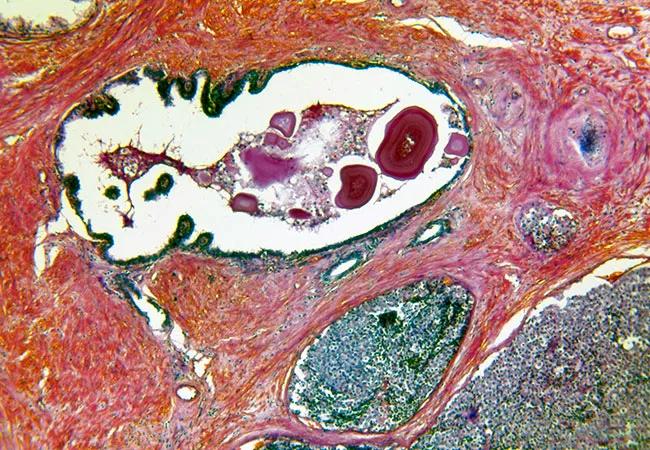Setting a new benchmark for control arm estimates

The phase 3 SWOG S1216 trial has set a new benchmark for survival estimates for metastatic hormone-sensitive prostate cancer (mHSPC) patients who have access to multiple approved subsequent life-prolonging therapies, according to findings presented at the American Society of Clinical Oncology (ASCO) 2021 Annual Meeting.
Advertisement
Cleveland Clinic is a non-profit academic medical center. Advertising on our site helps support our mission. We do not endorse non-Cleveland Clinic products or services. Policy
“At the time this study was being designed, the only option for mHSPC patients was androgen deprivation therapy,” notes study co-chair Shilpa Gupta, MD, Department of Hematology and Medical Oncology, Cleveland Clinic. “The aim of this trial was to determine how best to improve the outcomes of these patients with upfront treatment intensification.”
To accomplish this, the research team set out to explore the benefits of the novel agent TAK-700, an oral selective nonsteroidal 17, 20-lyase inhibitor, compared with bicalutamide — a drug that received FDA approval in the last few years, according to Dr. Gupta.
The study enrolled patients with newly diagnosed mHSPC with distant metastatic disease, a Zubrod performance status of 0-2, and a PSA of ≥ 2 ng/ml. They were randomized 1:1 to receive androgen deprivation therapy plus TAK-700 (300 mg twice daily) or androgen deprivation therapy plus bicalutamide (50 mg daily).
The primary endpoint was overall survival (OS). Secondary endpoints included progression-free survival (PFS), PSA at seven months and adverse event profile. From March 2013 to July 2017, researchers randomized 1,313 patients, and 1,279 were included in the intention-to-treat analysis. The median age of study participants was 68 years, and 10% of subjects were Black. The median PSA was 3030 ng/mL, and 49% had extensive disease.
As of March 2021, 192 (30.1%) patients remained on treatment in the TAK-700 arm compared with 100 (15.6%) in the bicalutamide cohort. The researchers reported 525 deaths, which met the requirement for the final OS analysis.
Advertisement
After a median follow-up of 4.9 years, the data showed a significant improvement in PFS and PSA response with TAK-700 compared with bicalutamide. However, the researchers observed no improvement in OS. An improvement in median OS of approximately 11 months with TAK-700 treatment versus bicalutamide did not meet the prespecified criteria for statistical significance.
More grade 3/4 adverse events were reported in patients who received TAK-700 compared with those who underwent treatment with bicalutamide (43% vs. 14%). These included hypertension (20% vs. 5%) and fatigue (5% vs. 2%).
Importantly, the median OS of 70 months in the control arm is 16 months higher than originally estimated and the highest among any other contemporary phase III trial in this patient population.
“This sets a new benchmark for what the estimates should be for control arms in such trials as well as counseling patients on survival estimates,” says Dr. Gupta. “This study has not only shown us that treatment intensification upfront is very important compared with androgen deprivation therapy alone, but it also highlights that men with hormone-sensitive prostate cancer who receive subsequent life-prolonging therapies are living much longer than previously expected.
“And so, when designing new trials, we have to keep that in mind in terms of what benefit to expect or how to make it clinically meaningful,” she concludes. “This trial was a huge endeavor by the entire team and NCI and provides valuable information. Correlative and biomarker-based work is currently underway to identify biomarkers of response and resistance.”
Advertisement
Advertisement

Radiation therapy helped shrink hand nodules and improve functionality

Standard of care is linked to better outcomes, but disease recurrence and other risk factors often drive alternative approaches

Phase 1 study demonstrates immune response in three quarters of patients with triple-negative breast cancer

Multidisciplinary teams bring pathological and clinical expertise

Genetic variants exist irrespective of family history or other contributing factors

Study shows significantly reduced risk of mortality and disease complications in patients receiving GLP-1 agonists

Structured interventions enhance sleep, safety and caregiver resiliency in high-acuity units

Addressing rare disease and challenging treatment course in an active young patient